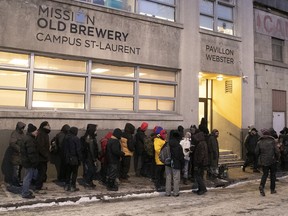As we mark the International Day of Older Persons, there is an urgent need for action to prevent further growth in homelessness in this vulnerable population.

Article content
The economic inequality that exists in our society is glaringly evident in the living conditions of our seniors. Depending on social class, some enjoy an active and comfortable retirement, while the most vulnerable live in financial insecurity with limited access to essential services and health-care support.
On Oct. 1, the International Day of Older Persons, we should give some thought to the fundamental questions these disparities raise about the equity and dignity we, as a society, offer our seniors. In particular, I am dismayed by the growing numbers of people experiencing their first episode of homelessness later in life, as they approach old age.
Advertisement 2
Story continues below
Article content
It doesn’t take much: People over 50 who are isolated and financially insecure can easily slip through the holes in our social safety net. In many cases, they are already in frail health but cannot access many government programs and services — in areas including health and social services, home care, housing, transportation, justice, employment and others — until they turn 65.
So what do they do in the interim — the critical 15 years until age 65? This is where they fall into the Bermuda Triangle of government assistance, left to fend for themselves because of a cascade of systemic failures in our social policies.
Living on the streets during those 15 years has a terrible impact on a person’s health. People in this situation suffer severe physical and cognitive decline and experience dramatic premature aging. Indeed, in the fields of social work and research, it’s common to categorize individuals experiencing homelessness as elderly starting from the age of 50. They may develop health problems normally associated with much older people, such as arthritis or dementia.
Article content
Advertisement 3
Story continues below
Article content
According to the 2022 homelessness head count by the Ministry of Health and Social Services, people age 50 and over accounted for 44 per cent of individuals experiencing homelessness in Montreal, making them the largest single age group in our city’s street population.
By the time they reach 65, people living on the street are closer to the physical and cognitive age of a 75-year-old and have mounting special needs, which makes their situation even more dire. It would test anyone’s resilience. The effort of finding housing becomes all the more daunting, the chances of getting off the streets even more remote.
To keep this problem from steadily worsening, we need to act early, long before age 65, to prevent people from ending up on the street. After the Old Brewery Mission launched its homelessness prevention service in 2021, it quickly became apparent that a program specifically tailored to seniors was needed.
This is what Ancrâge, a new prevention program to address the growing problem of seniors at imminent risk of homelessness, does, thanks to a $1.5-million donation from the Mirella and Lino Saputo Foundation and the support of the Rossy Foundation. To prevent homelessness among people over 50, the Old Brewery Mission acts as a social broker, identifying seniors at risk of homelessness and connecting them with appropriate housing services within its network or with the help of its partners.
Advertisement 4
Story continues below
Article content
We are also always on the lookout for potential partner organizations to deliver the most comprehensive services possible. We hope that over the next five years, nearly 750 seniors will avoid homelessness thanks to Ancrâge.
However, we can’t turn back the tide on our own. There has been progress on reducing evictions of seniors but it’s not enough. The full extent of the problem must be recognized and more resources and policies must be put in place for those in precarious situations well before the age of 65. There is an urgent need for action to prevent any further growth in homelessness in this vulnerable population.
That’s why we need a captain at the helm and a full crew on deck. And we need them now. We urge the minister of health and social services, along with the ministers responsible for seniors and housing, to act now — to avoid the worst.
Georges Ohana is the director of homelessness prevention and diversion at the Old Brewery Mission in Montreal.
Recommended from Editorial
-

‘A more dignified space’: Old Brewery Mission converts dorms into semi-private rooms at women’s shelter
-

From humble beginnings to $5-million gift for the unhoused
-

Allison Hanes: Montrealer’s $3-million donation for the unhoused sets a priceless example
-

Opinion: Montreal, let’s hear more ‘Yes, in my backyard’ (YIMBY)
Advertisement 5
Story continues below
Article content
Article content




Comments